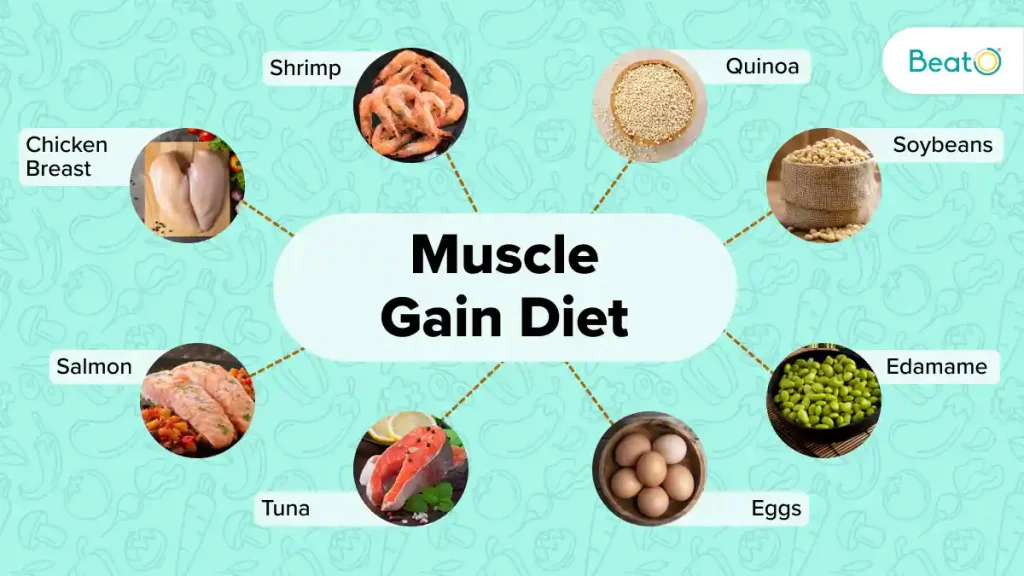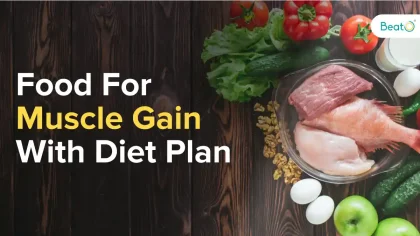Having muscle is the objective of many people be it athletes, fitness freak or people who desire to improve their functional and physical fitness. Muscle Gain Diet is one of the most important factors for reaching, not only the goal of muscle building but also for the overall goal of getting a healthy body. Eating the right diet, with proteins, carbohydrates, and healthy fats, feeds the muscles with what they require for their development.

In this article, we’ll delve into the key components of a muscle gain diet and provide you with a comprehensive guide, including a detailed weekly diet chart, to help you reach your fitness goals. Being aware of the significance of the right nutrition and implementing a solid muscle gain diet implies for you that you can reach your all goals in muscle-building and get the physique you are yearning for.
Muscle Gain Diet Plan

To help you achieve your muscle-building goals, here is a sample muscle gain diet chart that you can use as a starting point:
Monday
- Breakfast: Chicken sandwich (4 slices whole grain bread) + 1 cup skimmed milk
- Mid-Meal: 1 portion fresh fruit salad + 1/2 cup cottage cheese
- Lunch: 1.5 cups vegetable pulav rice + 1 cup soya chunk curry + 1/2 cup low-fat yoghurt
- Evening: 1 cup light tea + 1 cup grilled chicken salad
- Dinner: 3 whole wheat chapatis + 1/2 cup cooked lady’s finger
Tuesday
- Breakfast: 3 sprouted whole wheat and paneer paratha + green chutney
- Mid-Meal: 1 cup boiled black chickpeas
- Lunch: 1.5 cup cooked rice + 150 g chicken curry + 1/2 cup cooked spinach subji + 1/2 cup low-fat yogurt
- Evening: 1 portion of fresh fruit salad + 1/2 cup yoghurt
- Dinner: 1 cup cooked broken wheat upma + 1/2 cup cooked green beans
Wednesday
- Breakfast: 2 soya flour uttapam + tomato/green chutney + 1 glass skimmed milk
- Mid-Meal: 1 portion fresh fruit salad + 1/2 cup cottage cheese
- Lunch: 1.5 cups cooked rice + 1 cup kidney beans curry + 1/2 cup cucumber salad + 1/2 cup cooked lady’s finger
- Evening: 1 cup light tea + 1 cup brown rice flakes poha with nuts
- Dinner: 3 whole wheat dosa + 1 cup cooked bitter gourd subji
Thursday
- Breakfast: 2 mushroom paratha + tomato chutney + 2 scrambled eggs
- Mid-Meal: 1 cup plain yoghurt with raw/grilled vegetables
- Lunch: 1/2 cup cooked rice + 3 medium whole wheat chapatis + 1 cup fish masala (180 g fish) + 1/2 cup cooked snake guard subji
- Evening: 1 cup boiled chickpeas + 1 cup light tea
- Dinner: 3 whole wheat chapatis + 1/2 cup mixed vegetable curry
Friday
- Breakfast: 4 idli + 1/2 cup sambar + 1 tbsp green/tomato chutney + 2 egg whites
- Mid-Meal: 1 cup banana + almond milk shake
- Lunch: 1 cup cooked rice + 1/2 cup soya chunk curry + 1/2 cup cooked lady’s finger + small cup low-fat yoghurt
- Evening: 1 cup light tea + homemade protein bar
- Dinner: 3 whole wheat chapatis + 1/2 cup cooked ridge gourd subji
Saturday
- Breakfast: 2 chicken keema paratha + 1 tbsp green chutney + 1 glass skim milk
- Mid-Meal: 1 cup boiled chickpeas
- Lunch: 4 whole wheat chapatis + 150 g grilled chicken + 1/2 cup cooked dhal + 1/2 cup cucumber salad
- Evening: 1 cup blueberry milkshake
- Dinner: 1 cup cooked broken wheat upma + 1/2 cup cooked green beans
Sunday
- Breakfast: 4 whole wheat chapatis + 1 cup scrambled eggs
- Mid-Meal: 1 cup cooked green gram sprouts
- Lunch: 4 whole wheat chapatis + 1/2 cup mixed vegetable salad + 180 g fish curry + 1/2 cup cooked cabbage
- Evening: 1 portion fresh fruit + 1/2 cup cottage cheese
- Dinner: 3 whole wheat chapatis + 1/2 cup tomato-based vegetable curry
The Importance of Protein In Muscle Gain Diet
Protein, the essential ingredient for the muscles, requires constant intake because it is crucial for a muscle gain diet. A sufficient intake of high-grade protein will allow the repair of the muscle fibres and further muscle tissue regeneration. The supplement advisers recommend that the muscle builders increase their protein intake proportionately between 0.7-0.9 grams of protein per pound and 1.2-1.5 grams of protein per kilogram per day. This can be accomplished in several ways and through a variety of protein-rich food sources. Lean meat, fish, eggs, dairy products, legumes and protein supplements are among the protein-rich foods which we can consume.
Also Read: Proven Health Benefits of Pistachios
Carbohydrates and Muscle Growth
Carbohydrates are an essential part of a muscle gain diet simply because they offer the energy essential in fueling tough workouts and also perform a vital function during recovery. Short carbohydrates like whole grains, fruits and vegetables are quite useful as they tend to give a constant source of energy and are packed with fibre, vitamins and minerals. Try to include these energy-supplying, nutrient-dense carbs in your muscle gain diet this will help in accomplishing your fitness objectives.
Healthy Fats and Muscle Building
In addition to protein, fatty acids are the cornerstone of a muscle growth diet, however, they are often not given the prominence they deserve. Fats supply energy, they help hormones to be produced, and they assist in the absorption of fat-soluble vitamins. Along with eating high protein foods, aim to include some sources of unsaturated fats, like avocados, nuts, seeds, and olive oil, in your diet to reap the benefits of them as well.
Also read: Amazing Guava Benefits For Heart Health & Weight Loss
Meal Timing and Muscle Growth
The proper diet schedule can control muscle growth equally. Eating a protein-rich snack or a shake before and after the workouts is a great way to maximize muscle protein synthesis and support the recovery process. Apart from taking nutrient-rich snacks during the day, one should also make sure that the nitrogen balance is positive, which allows for the growth of muscles.
Add The Following Foods to Gain Muscle In Your Diet
Here are some foods to Gain Muscle that you need to incorporate into your diet for fast muscle growth that will help to get the desired physique.
1. Eggs: High in protein with essential amino acids which are needed in muscle growth. Meanwhile, eggs, in addition to vitamins and minerals of benefit, including vitamin D and choline, promote good health and also improve muscle function.
2. Salmon: Rich in protein and omega-3 fatty acids, which support muscle health. Salmon is also a good source of B vitamins and antioxidants, promoting recovery and reducing inflammation.
3. Chicken Breast: A source of lean protein that will aid in muscle growth as well as maintenance. Additionally, chicken is also low fat and easy to use in the recipes.
4. Greek Yogurt: Provides a combination of fast- and slow-digesting proteins. Greek yoghurt is also a good source of calcium, which is essential for bone health and muscle function.
5. Tuna: A high-protein, low-fat option that also contains omega-3s. Tuna is a versatile fish that can be enjoyed in various ways, such as in salads, sandwiches, or as a standalone meal.
6. Lean Beef: It helps in the provision of protein, B vitamins, and creatine, which bolster muscle growth. This type of beef is also a good iron supplier, and it is important because of oxygen transportation and energy creation during the exercise.
7. Shrimp: A low-calorie, high-protein seafood option. Shrimp is also rich in selenium, a mineral that plays a role in muscle recovery and immune function.
8. Soybeans: Includes proteins of good quality and various vitamins and minerals. Soybeans are a multi-functional ingredient that will perfectly fit in most meals, whether it is a stir-fry, a salad or a snack.
9. Cottage Cheese: A dairy product rich in casein protein, which is slow-digesting. Cottage cheese is also a good source of calcium and can be enjoyed on its own or used in recipes.
10. Turkey Breast: Offers a lean protein source with minimal fat. Turkey is also a good source of niacin, which is involved in energy metabolism and muscle function.
11. Tilapia: A mild-flavoured fish that provides a good amount of protein. Tilapia is also low in mercury, making it a safe and sustainable seafood option.
12. Beans: Legumes that are a valuable source of plant-based protein and complex carbohydrates. Beans are also rich in fibre, which can promote feelings of fullness and support digestive health.
13. Whey Protein Powder: Easier and faster way to get your daily protein. As a component that is quickly assimilated, whey protein can help in the process of muscle recovery and growth when consumed during workouts.
14. Edamame: Immature soybeans that are a good source of plant-based protein. Edamame also contains fibre, vitamins, and minerals that contribute to overall health and muscle function.
15. Quinoa: A whole grain that provides a balance of protein, carbohydrates, and fibre. Quinoa is also a good source of various minerals, including magnesium, which is involved in muscle contraction and energy production.
Also Read: Top 7 Proven Health Benefits of Pistachios: A Crunchy
Conclusion
Developing a significant and muscular body demands a systematic process that encompasses properly planned nutrition for muscle mass gain as well as persistent strength training. This article offers three key points which are the need for protein priority, incorporation of complex carbohydrates, and addition of healthy fats and proper timing for meals and snacks to assist muscle gain. The muscle gain diet chart provided here can work as a beginning plan for you, amending it according to your individual calorie and macronutrient requirements suggested by your doctor or dietitian.
Consistency and patience, the two most crucial elements in muscle building, are hard to come by. Forget about eating unhealthy food all the time and include different healthy foods (not only protein!) in your meal plan. Train every muscle with your strength training program and you will achieve your goal. Alongside commitment and the correct strategy, you can use your full muscle-building abilities to achieve the fit body you have always dreamed of.
Disclaimer: The content of this article is compiled information from generic and public sources. It is in no way a substitute, suggestion, or advice for a qualified medical opinion. Always consult a specialist or your own doctor for more information. Beato App does not claim responsibility for this information.
Are you looking for the perfect glucometer to check your blood sugar level? Try out BeatO smartglucometerkit, affordable and easy to use.
Discover top-tier diabetes care with BeatO’s Chief Clinical Officer,Dr. Navneet Agarwal. His expertise in Diabetes ensures personalised guidance for overall health. Try out a smartglucometerand keep track of blood sugar levels now.




